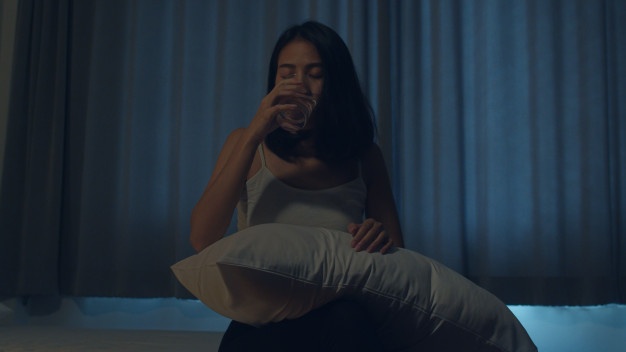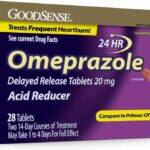Why Is Montelukast Taken At Night?

What is Montelukast?
Montelukast is in a class of medications called leukotriene receptor antagonists (LTRAs). It works by blocking the action of substances in the body that cause the symptoms of asthma and allergic rhinitis.
Montelukast is used to prevent wheezing, difficulty breathing, chest tightness, and coughing caused by asthma in adults and children 12 months of age and older. Montelukast is also used to prevent bronchospasm (breathing difficulties) during exercise in adults and children 6 years of age and older. Montelukast is also used to treat the symptoms of seasonal (occurs only at certain times of the year), allergic rhinitis (a condition associated with sneezing and stuffy, runny or itchy nose) in adults and children 2 years of age and older, and perennial (occurs all year round) allergic rhinitis in adults and children 6 months of age and older.
Montelukast should be used to treat seasonal or perennial allergic rhinitis only in adults and children who cannot be treated with other medications.
How should Montelukast be used?
Montelukast comes as a tablet, a chewable tablet, and granules to take by mouth. Montelukast is usually taken once a day with or without food. When montelukast is used to treat asthma, it should be taken in the evening. When montelukast is used to prevent breathing difficulties during exercise, it should be taken at least 2 hours before exercise.
If you are taking montelukast once a day on a regular basis, or if you have taken a dose of montelukast within the past 24 hours, you should not take an additional dose before exercising. When montelukast is used to treat allergic rhinitis, it may be taken at any time of day. Take montelukast at around the same time every day.
Follow the directions on your prescription label carefully, and ask your doctor or pharmacist to explain any part you do not understand. Take montelukast exactly as directed. Do not take more or less of it or take it more often than prescribed by your doctor.
If you are giving the granules to your child, you should not open the foil pouch until your child is ready to take the medication. There are several ways that you can give the granules to your child, so choose the one that works best for you and your child. You may pour all of the granules directly from the packet into your child’s mouth to be swallowed immediately. You may also pour the entire packet of granules onto a clean spoon and place the spoonful of medication in your child’s mouth. If you prefer, you may mix the entire packet of granules in 1 teaspoon (5 mL) of cold or room temperature baby formula, breast milk, applesauce, soft carrots, ice cream, or rice.
You should not mix the granules with any other foods or liquids, but your child may drink any liquid right after he or she takes the granules. If you mix the granules with one of the allowed foods or drinks, use the mixtures within 15 minutes. Do not store unused mixtures of food, formula, or breast milk and the medication.
Do not use montelukast to treat a sudden attack of asthma symptoms. Your doctor will prescribe a short-acting inhaler to use during attacks. Talk to your doctor about how to treat symptoms of a sudden asthma attack. If your asthma symptoms get worse or if you have asthma attacks more often, be sure to call your doctor.
If you are taking montelukast to treat asthma, continue to take or use all other medications that your doctor has prescribed to treat your asthma. Do not stop taking any of your medications or change the doses of any of your medications unless your doctor tells you that you should. If your asthma is made worse by aspirin, do not take aspirin or other nonsteroidal anti-inflammatory drugs (NSAIDs) during your treatment with montelukast.
Montelukast controls the symptoms of asthma and allergic rhinitis but does not cure these conditions. Continue to take montelukast even if you feel well. Do not stop taking montelukast without talking to your doctor.
Why take Montelukast at night?
Although studies that evaluated the effectiveness of Montelukast taken in the morning and night found no statistical differences between taking the drug in the morning or evening. Experts recommend that Montelukast should be taken at night for the treatment of asthma because symptoms tend to be worse at night.
Nocturnal asthma, with symptoms like chest tightness, shortness of breath, cough, and wheezing at night, can make sleep impossible and leave a patient feeling tired and irritable during the day. These problems may affect their overall quality of life and make it more difficult to control their daytime asthma symptoms.
What are the side effects of montelukast?
Montelukast oral tablets can cause mild and serious side effects. The following lists contain some of the key side effects that may occur while taking montelukast oral tablets. These lists do not include all possible side effects.
For more information about the possible side effects of montelukast oral tablets, talk with your doctor or pharmacist. They can give you tips on how to manage any side effects that may be concerning or bothersome.
Note: The Food and Drug Administration (FDA) tracks side effects of drugs it has approved. If you would like to notify the FDA about a side effect you’ve had with montelukast oral tablets, you can do so through MedWatch.
Mild side effects
Mild side effects of montelukast oral tablets can include:
- upper respiratory infection
- fever
- headache
- sore throat
- cough
- abdominal (belly) pain
- diarrhea
- earache or ear infection
- runny nose
- sinusitis (pain or swelling in your sinuses)
- joint pain
Most of these side effects may go away within a few days or a couple of weeks. But if they become more severe or don’t go away, talk with your doctor or pharmacist.
Serious side effects
Serious side effects from montelukast oral tablets aren’t common, but they can occur. Call your doctor right away if you have serious side effects. Call 911 or your local emergency number if your symptoms feel life threatening or if you think you’re having a medical emergency.
Serious side effects and their symptoms can include:
- Increased levels of eosinophils (a type of white blood cell), which can sometimes cause severe vasculitis (swelling throughout your blood vessels). This is also known as Churg-Strauss syndrome. Symptoms can include:
- numbness or tingling in your arms or legs
- flu-like symptoms, such as chills or body aches
- rash
- severe pain and inflammation (swelling and damage) in your sinuses
- worsened asthma symptoms, such as trouble breathing
- Thrombocytopenia (low levels of platelets in your blood), which usually only causes symptoms in severe cases. Symptoms can include:
- bruising easily
- nosebleeds
- gum bleeding or other bleeding that seems to occur randomly
- petechiae on your skin (small, dark spots that are caused by bleeding)
- Severe rash or swelling, such as Stevens-Johnson syndrome.
- Allergic reaction.
- Serious behavior or mood changes, including suicidal thoughts or behaviors.
- Sleep problems.
- Liver issues.
Side effects in children
Montelukast oral tablets are approved for use in adults as well as adolescents ages 15 years and older. The side effects in adolescents are expected to be the same as the side effects in adults.
Note: Other forms of montelukast are approved for use in younger children. This article only addresses the oral tablet form of montelukast. For information on the side effects of montelukast’s other forms, talk with your doctor or pharmacist.
Side effect details
Here’s some detail on certain side effects this drug may cause.
Serious behavior or mood changes
Serious changes in behavior and/or mood have been reported in people taking montelukast oral tablets.
The drug has a boxed warning about this side effect. This is the most serious warning from the FDA. A boxed warning alerts doctors and patients about drug effects that may be dangerous.
Some examples of these changes include:
- depression
- anxiety
- aggressive behavior
- confusion
- stuttering
- hallucinations (seeing or hearing things that aren’t really there)
- memory problems
- behaviors similar to those caused by obsessive-compulsive disorder (OCD)
- suicidal thoughts or behaviors
- tic (irregular, uncontrollable muscle movements) or tremors (uncontrolled shaking)
Serious behavior or mood changes didn’t occur in clinical studies of montelukast oral tablets. But they’ve been reported since the drug became available. These problems have occurred:
- during treatment with montelukast oral tablets and after people have stopped taking the drug
- in people with or without previously diagnosed mental health conditions
Because of these possible side effects, montelukast oral tablets should only be used when the benefits of treatment outweigh these risks. If you have allergic rhinitis, your doctor will likely only recommend this drug for you if you’ve already tried other treatments and they didn’t work for you.
If you (or those around you) notice mood or behavior changes while you’re taking montelukast oral tablets, call your doctor right away. Your doctor will likely have you stop taking montelukast. They may also suggest immediate treatment for this side effect, depending on your symptoms.
If you’re having suicidal thoughts or behaviors, call 911 or go to the nearest hospital or medical care facility. Healthcare professionals are always available and willing to help you get the care you need.





